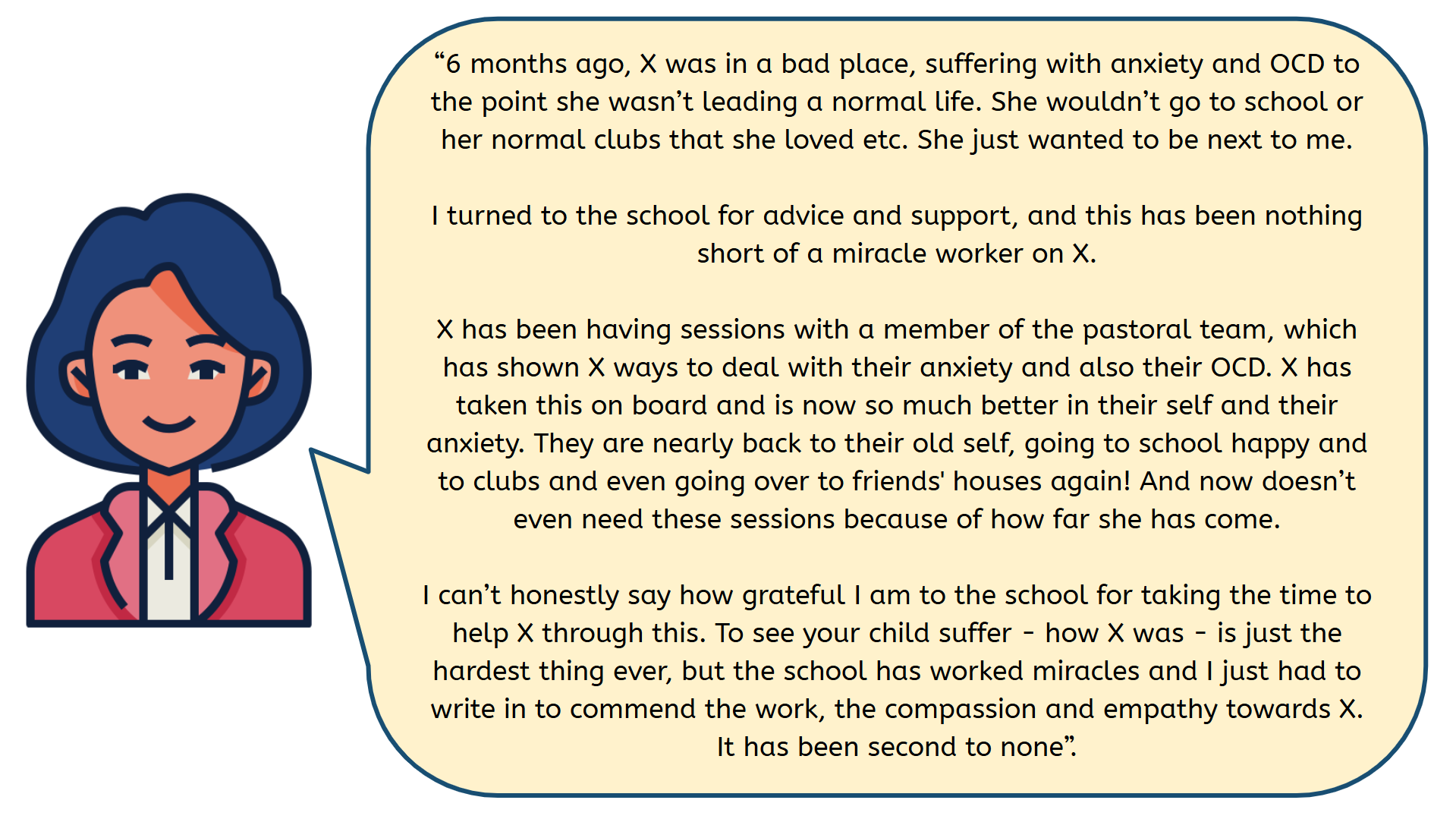Special Educational Needs and Disabilities

Oakhurst Community Primary School provides a broad and balanced curriculum for all children, where all teachers are teachers of Special Educational Needs (SEN). When planning, teachers set suitable learning challenges and respond to children’s diverse learning needs. A minority of children may have particular learning and assessment requirements that could create barriers to learning. These requirements are likely to arise as a consequence of a child having a Special Educational Need or Disability (SEND). Teachers take account of these requirements and together with the Special Educational Needs and Disabilities Coordinator (SENDCo), parents and carers and make provisions where necessary to support individuals or groups of children. In turn, this enables them to participate effectively in curriculum and assessment activities.
Children may have special educational needs and disabilities either throughout, or at any time during their school life. Oakhurst Community Primary School’s approach ensures that curriculum planning and assessment for children with special educational needs and disabilities takes account of the type and extent of the difficulty experienced by the child.
We encourage all of our parents and carers to read this policy so that they feel empowered to help support the school’s approach to supporting children who may develop barriers to learning.
Special Educational Needs and Disabilities Policy
You can view our Accessibility Plan by clicking on the link below:
Four Broad Areas of Need
Through our consideration and exploration of a child’s developing needs and barriers to learning, we may begin to assign these to one or more of these four broad areas:
- Communication and interaction (C&I)
- Cognition and Learning (CogL)
- Social, Emotional and Mental Health (SEMH)
- Sensory and / or Physical
A Graduated Response to SEND

When engaging with individual pupils and exploring their unique needs and barriers to learning, we adopt what we refer to as a ‘Graduated Response’:
- Assess
- Plan
- Do
- Review
A summarised presentation of the process is presented below.
Identification Through Ongoing Assessment
Alongside the presentation of the Oakhurst Curriculum, our teachers are constantly engaging in a process known as Assessment for Learning (AfL). Put simply, our teachers identify what learning has been retained successfully, where there are misconceptions (material committed to memory erroneously) and where concepts have not been committed to memory at all or have been forgotten.
This ongoing process eventually enables teachers to identify individuals who are falling behind Age-Related Expectations (ARE).
Quick Checker
Once the threshold has been reached through Assessment for Learning and an individual has been identified as requiring additional exploration of their learning, teachers will use the school’s ‘Quick Checker’ tool.
Through inputting their observations of the child, a picture begins to emerge of potential barriers to learning aligned to one or more of the four broad areas categorised above.
Progress Tracker
Once the ‘Quick Checker’ has been completed, its output is used to create a set of targets for the child that are monitored regularly and progress is measured against the relevant age-related expectations. These targets are supported through universal provision. In simple terms, this refers to quality first teaching and actions that are taken by the staff present in the child’s class.
At this stage, if the child makes acceptable progress towards these targets and exhibits learning more closely linked to their age-related expectations, then the Progress Tracker may be discontinued, but kept on record in case of any future considerations of learning difficulties.
My Plan
If following engagement with a ‘Progress Tracker’ the child has not made acceptable progress and remains below the relevant age-related expectations, a ‘My Plan’ will be created for the child in order to support their developing learning needs and requirements.
A My Plan is a series of specific and measurable targets that are set for the child that will be considered and reviewed at regular intervals throughout the academic year.
Once a My Plan has been created, it will be shared with the child’s parents and carers. Following the successful completion of each review cycle, all subsequently created new plans will also be shared with parents and carers.
All associated documentation is compiled in what is called a ‘My Plan Journal’.
The school hosts regular My Plan Journal sharing sessions for parents of children with SEND. This is a great opportunity to share the progress with your child, have coffee and cake and meet other parents.
Education and Health Care Plans
Collaboratively, we may reach an agreement that a child requires a higher level of support. In these cases we may apply for an Education, Health and Care (EHC) Plan.
'An education, health and care ( EHC ) plan is for children and young people aged up to 25 who need more support than is available through special educational needs support. EHC plans identify educational, health and social needs and set out the additional support to meet those needs.'
(Gov.uk)
For more information about the Education, Health and Care Plan process, please visit the link below:
Gov.uk Education, Health and Care Plan Website
A Wide Range of Support Streams
Once individuals have been identified, the school have access to a number of support streams and resources that may be recommended as part of remedial plans to help children close any learning gaps that might be emerging. This list is by no means exhaustive, but present an outline:
Mental Health and Wellbeing
- Drawing and Talking Therapies
- Emotional Literacy Sessions
- Lego Therapy
Dyslexia
- Coloured visual overlays
- Checklists
- Alternative methods of recording (use of assistive technology)
Core Subjects
- Precision teaching for reading and spelling
- Colourful Semantics (writing)
- Slow Writing (writing)
- The Fluency Project (reading)
- Read Write Inc. Tutoring (phonics)
- Number Stacks (maths)
- Power of 2 (maths)
Physical and Sensory
- On-site sensory room
- Wobble cushions
- Chewelery
Working in Partnership
At Oakhurst Community Primary School, we believe that working in partnership is pivotal to the success of our children. We consider our partnerships with parents, carers and external agencies to be of the utmost importance when supporting children to reach their full potential.
To this end, we will regularly and actively involve parents and carers at each step of the process. Insights and observations from within the home are extremely important when considering the best plan of action.
We work in partnership with a great many external agencies including and not limited to:
- Educational Psychology (Ed. Psych or EP)
- Social Emotional and Mental Health (SEMH) Outreach Team
- Occupational Therapist (OT)
- Speech and Language Therapists (SaLT)
- Physical Disabilities (PD) Team
- Hearing Impairment Team
- Advisory Teaching Service for Cognition and Learning (ATCL)
This enables us to seek additional viewpoints and perspectives on the individual learning needs and barriers of our pupils. Parental or carer consent will always be sought in advance of such referrals and requests for service.



Additional Resources as Part of Our Offer
- Suicide ASSIST trained members of staff
- Well-resourced sensory and therapy Rooms
- A school ethos centred around access for all and providing aspirational outcomes for pupils with SEND
- Breakout areas to support emotional regulation
- Regular and supportive ‘Team Around the Family’ (TAF) meetings for families and children in need of early intervention
How can I find out more?
We are always more than happy to help.
If you have any queries, or you would like to find out more, please use the Enquiry Form found by navigating to the ‘Contact Us‘ tab on the main menu. Alternatively, you can direct your query to admin@oakhurst.swindon.sch.uk and we will put you in contact with the relevant member of staff.

